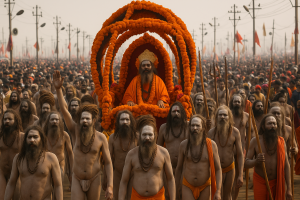Among the most iconic and revered features of the Kumbh Mela is the majestic presence of the ancient Shri Panchdashnam Atal Akhara. As one of the oldest and most spiritually disciplined Akharas in the Dashnam Sannyas tradition, Atal Akhara plays a leading role in the rituals, processions, and spiritual gatherings that define the grandeur of this world-renowned event.
Held every 12 years in rotation at Prayagraj, Haridwar, Ujjain, and Nashik, the Kumbh Mela is a celebration of divine knowledge, Vedic culture, and spiritual unity, attracting millions of devotees, saints, sadhus, scholars, and seekers from around the globe. Atal Akhara’s involvement is not just traditional—it is transformational.
The Royal Entry – Shahi Snan and Procession
One of the most anticipated moments of the Kumbh Mela is the Shahi Snan (royal bath), during which Akharas lead grand processions to the sacred river for ritual bathing. Atal Akhara, with its elephant-led procession, chanting of Vedic mantras, conch sounds, nagas, mahants, and Acharyas, creates a deeply spiritual and majestic atmosphere that is both humbling and electrifying.
This procession symbolizes the triumph of purity, renunciation, and spiritual courage, and is a blessing for the countless pilgrims who witness it. Atal Akhara’s disciplined march reflects centuries of inner tapasya and unwavering dedication to Dharma.
Spiritual Discourses and Mass Initiations
During the Kumbh Mela, Atal Akhara organizes satsangs, Vedic discourses, Gita and Upanishad pravachans, yajnas, and public darshans of respected saints and Mahamandaleshwars. These events offer devotees rare opportunities to absorb timeless spiritual wisdom and ask questions on dharma, karma, and moksha.
In many Kumbhs, Atal Akhara also conducts mass initiations (diksha) for new aspirants entering the monastic life. These sacred rituals are done with strict adherence to Dashnam Sannyas traditions, ensuring the preservation of authentic spiritual discipline in the next generation.
Service and Spiritual Leadership
Apart from rituals and discourses, Atal Akhara also sets up free food distribution (bhandaras), medical camps, and spiritual counseling centers for pilgrims. The Akhara believes that seva (selfless service) is as vital as spiritual sadhana.
Its Mahamandaleshwars often meet with leaders, spiritual dignitaries, and interfaith groups to promote harmony and shared dharmic values. In this way, Atal Akhara serves not only as a spiritual guide but also as a moral and cultural anchor in turbulent times.
Conclusion
The Kumbh Mela is incomplete without the divine energy of Atal Akhara. From its grand entry in the Shahi Snan to its spiritual leadership through discourses, seva, and initiations, Atal Akhara stands as a pillar of Sanatana Dharma in every Kumbh. Its participation is not merely ceremonial—it is a living continuation of India’s spiritual soul.


